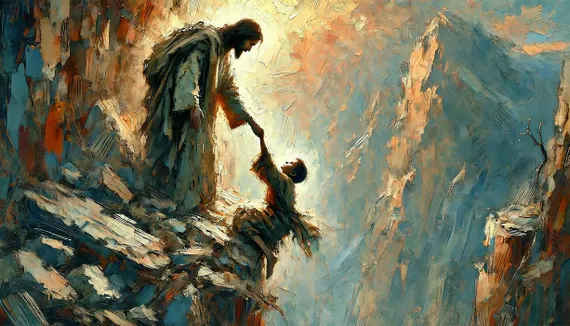“Our God Saves”
2 Kings 2–4
There is no situation too ancient, too self-inflicted, or too dire for the saving power of our God. That’s the testimony of Scripture. That’s the story of 2 Kings. That’s the Gospel.
Our God saves—this is not merely a truth for someone else or for another time. This is the heartbeat of God’s character through every generation: he steps into cursed places, into foolish choices, into overwhelming distress, and brings about redemption. But this saving work, though always God’s initiative, often calls for a human response. It’s not enough to stand still with arms crossed, waiting for rescue without a heart turned toward the Rescuer. He works through obedience, through trust, through steps of faith taken by ordinary people who cry out to him.
When Elisha stepped into Jericho, he stepped into a place living under a curse. The very ground carried the weight of a promise made centuries before—Jericho, rebuilt, would be a city founded on death. And indeed it was. The water was bad, the land unproductive. But the people, aware of their need, did the one right thing: they brought their problem to God’s prophet. And Elisha didn’t merely purify the water—he enacted a covenant of salt, a symbol of enduring relationship and preservation. In that moment, the curse was broken. Life returned to dead land. Isn’t that the Gospel? Jesus, the one greater than Elisha, comes to us—not to fix the surface, but to reverse the deep, ancient curse of sin through a new and better covenant. He is the salt of the earth, and by his life, death, and resurrection, he has brought life where death once reigned.
The story continues, and this time, the problem isn’t a past curse—it’s a present failure. Three kings, in arrogance and haste, set out to war without consulting the Lord. It doesn’t take long for their wisdom to run dry—literally. With no water, facing certain defeat, they realize they are in over their heads. Joram, Israel’s wicked king, blames God. Jehoshaphat, king of Judah, seeks him. And so Elisha is called. He offers no flattery, but he offers God’s word. Water will come. Victory will come. But only because God is gracious. Even when people act faithlessly, God acts faithfully. That’s good news for every one of us who has ever rushed into decisions, ignored God’s voice, and then wondered why life fell apart. You may have created the mess, but God can still bring water to the desert. Jesus is your ally—not your accomplice in foolishness, but your redeemer from it. His grace doesn’t wait for your perfection; it finds you in your need and offers you a better way.
And then we meet a widow in distress—her husband dead, her debts mounting, her sons on the verge of slavery. She does what so many fail to do: she runs to God’s man. She asks for help. She obeys, even when the instructions seem unusual—gather empty jars, as many as she can. And into those jars, God pours abundance. Oil flows until the last jar is full. Her debt is paid, her family is saved, her life restored. The Gospel echoes here, too. Jesus comes to those crushed by debt—debt of sin, debt of despair—and he doesn’t just ease the burden, he cancels it. His provision isn’t meager. It’s abundant. It’s extravagant. The oil doesn’t just meet the need; it proclaims the glory of the Giver.
In all these stories, we see the hand of God extended toward his people—not because they earned it, not because they got it all right, but because he loves. Because he is compassionate. Because he is slow to anger and rich in mercy. The cross of Christ may not appear grand to the world, but it is there, in that suffering and death, that God did his greatest work—reversing the curse, covering our folly, meeting our deepest need.
So now the question is for you: will you receive this saving work? Will you trust the hand that reaches toward you, even now? You don’t need to fix yourself first. You don’t need to pretend you’re not desperate. You simply need to turn, to come, to ask. He is faithful. He is powerful. He is present.
Our God still saves.




